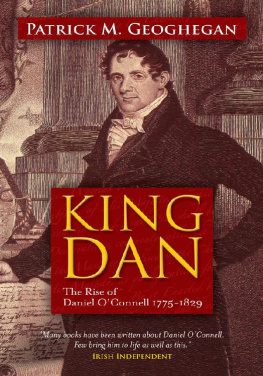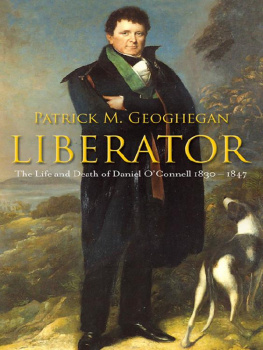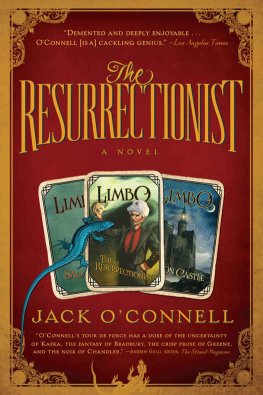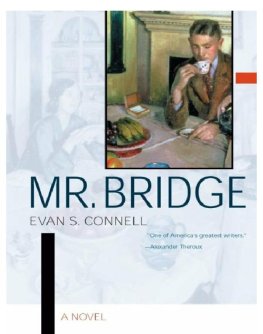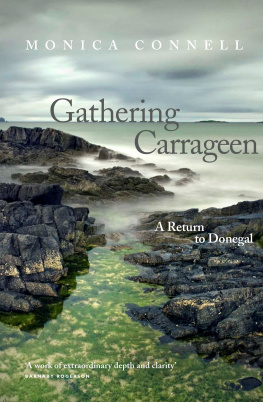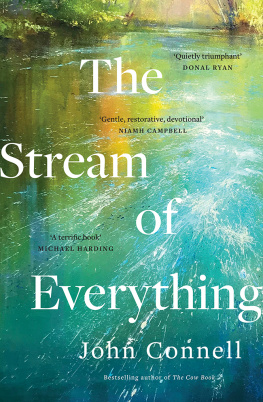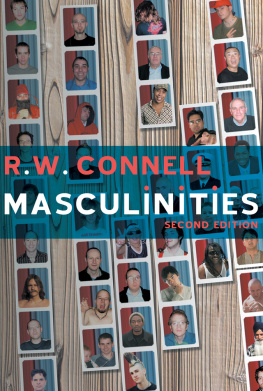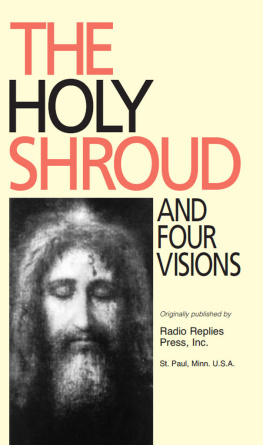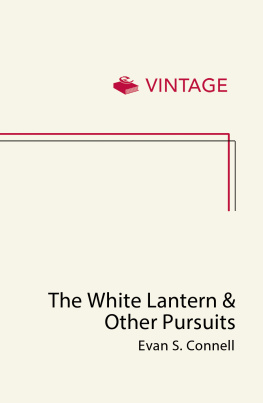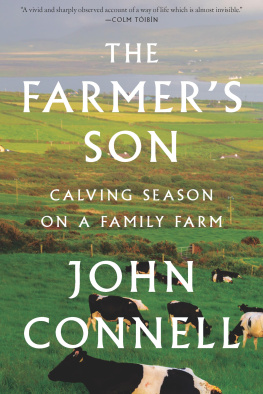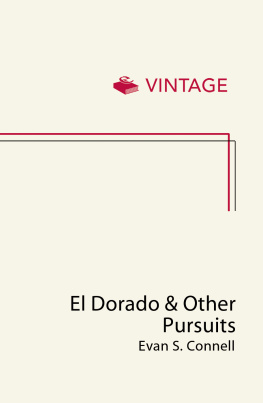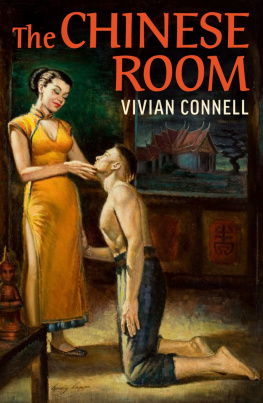
INTRODUCTION Ireland, it must be admitted, has been ungrateful to her great men. ( SPEECH OF DANIEL OCONNELL, 10 FEBRUARY 1827 ).
D aniel OConnell remains one of the most important and complex figures in Irish history. And yet, in recent years he has become unfashionable, sidelined by much lesser men and relegated to a position of relative obscurity. Perhaps this is because of OConnells rejection of violence, or perhaps because of the failure of his Repeal movement. When we think of OConnell we think of him in his final years, the hugecloaked Liberators form of James Joyces Ulysses , old and fat, engaged in constant compromises and, in the end, broken by the weight of expectations. The aim of this book is to show a different OConnell, young, lazy, aggressive, reckless, uncertain and unsure, who became involved in the campaign for Catholic emancipation and who transformed the movement and himself. This is the story of how OConnell became The Liberator.
Determined to be the best at whatever he did, OConnell trained to become one of the greatest orators of the age, with a magnificent voice that could move people to anger or to tears. One of the greatest lawyers in Irish history, OConnell tormented judges, terrorised opposing barristers, and won fame for saving the lives of so many men who would otherwise have been hanged. He became The Counsellor, the fearless defender of the people. And he secured that reputation through his successful campaign for Catholic emancipation.
Recognising that a culture of defeat afflicted Irish Catholics, OConnell set out from the beginning to confront authority, challenge the nature of British rule in Ireland, and make himself a symbol of defiance and resistance. Despite his hatred of the French Revolution, he became a radical in the 1790s and joined the United Irishmen, narrowly avoiding arrest during the 1798 Rebellion. In 1800 he took a defiant stand against the Act of Union, and it was his lifelong ambition to overturn that measure and restore the Irish parliament. First, he had to remove the remaining political and legal restrictions against the Catholics and secure the right to sit in Parliament. His campaign for Catholic emancipation was long and difficult, with an apathetic public and a divided Catholic leadership. His strategy was aggressive, ruthless and ultimately very effective. The climax came in 1828 when he stood for election in Co. Clare and defeated the Protestant Ascendancy after one of the most dramatic campaigns in Irish history.
But there was a darker side to OConnells character. In folklore he was a notorious womaniser, even after his marriage in 1802, although this has long been dismissed by historians unwilling to accept anything negative about their hero. The evidence presented here suggests that some of these stories were true. While he did not rape Ellen Courtenay in 1818, as she later accused him in print, he almost certainly had an affair with her and a number of other women. OConnell was flawed. Incapable of managing his finances, he was constantly in debt, running the risk of bankruptcy and of leaving his family destitute. In 1815 he killed a man in a duel and nearly followed it by fighting another one. He was incredibly vain, and his vanity increased with the passing of time. Violent and aggressive in his speeches, he embarrassed friends and horrified his enemies by his refusal to follow a moderate line of conduct. Instead, as he later boasted, he became more violent, and he succeeded.
The list of things OConnell has been blamed for is impressive. Sen OFaolin, who admired OConnell, none the less traced the decline of Irish mannersthe vulgarisation and cheapening of Irish societyto the aggression and vulgarity of OConnells speeches. And he added, How different it all is from, let us say, Robert Emmet with his plumed hat and his naked sword... Everybody who regards gracious living, nobility in thought and word and behaviour, must read this demagogue [OConnell] with a curl of distaste. OConnell was blamed for polarising Irish society along sectarian lines, for cheapening political discourse, for putting his own interests ahead of the Irish people. OConnell would have expected these criticisms. He once complained that he would never receive the credit he deserved for winning Catholic emancipation, because people would never understand the extent of the problems he faced. But he did what was necessary in the context of the time, and he did it without resorting to physical force.
This book provides a radical new interpretation of OConnells early life, his career as a lawyer, and his titanic struggle to win Catholic emancipation over a quarter of a century. Recognising his flaws as well as his greatness, it shows the forces that drove him to create and lead an entirely new movement in Irish politics. The 1916 Rising is today hailed as the moment when the modern Irish state was born. But it was OConnell who created the modern Irish nation, for better or for worse, in the nineteenth century. His constitutional approach, the way he channelled the power of moral force, did as much to create the modern Ireland and ensure that the institutions of the new state in the twentieth century were not still-born. This was the real legacy of King Dan, the man who persuaded the Irish Catholics that they were more than slaves, and who mobilised them to secure their freedom in 182829. In doing so, he helped create the modern Ireland.
ACKNOWLEDGMENTS
M y thanks are due to the Irish Research Council for the Humanities and the Social Sciences ( IRCHSS ) for the research fellowship in 20062007 which made this book possible. I am also indebted to a number of individuals. Fergal Tobin of Gill & Macmillan helped shape the project in its early stages and his advice led to some crucial revisions at the end. As always it has been a pleasure to work with him. I am grateful to all the staff at Gill & Macmillan for their excellent workEmily Miller who co-ordinated the design of the jacket, Deirdre Rennison Kunz for her editorial expertise, Helen Thompson, Claire Egan, Liz Raleigh and Esther Kallen. Professor Marianne Elliott and Dr Ian McBride were my IRCHSS referees and their encouragement and support was decisive. Professor Jane Ohlmeyer of the School of Histories and Humanities, Trinity College Dublin was an enormous help, especially with the initial IRCHSS application . My two colleaguesand friendsDr Robert Armstrong and Professor Ciaran Brady were always available to debate ideas and problems. I would also like to thank Professor John Horne for his support and influence throughout my career. My friends in the School of History and Archives in University College Dublin were also an inspiration, in particular Mary Daly, Richard Aldous, John McCafferty, Michael Laffan and of course, James McGuire. Professor Tom Bartlett of the University of Aberdeen provided invaluable support, and I am also grateful to his colleague Dr Michael Brown who allowed me to present on aspects of this book at various (splendid) conferences and seminars. I am also grateful to Dr Sen Patrick Donlan for allowing me to discuss OConnell at a legal history conference in Limerick. Dr Niamh Howlin provided important advice on the jury system in the nineteenth century and gave extensive feedback on the prologue; John Berrys legal expertise was also invaluable. Thanks to Professor Bill McCormack, I now have a complete set of the OConnell Correspondence, and I am also grateful to Dr Brian Jackson, Ted Brady, Trevor White, Mary Connellan and Professor Paul Bew for their assistance. Honora Faul, of the National Library of Irelands prints and drawings department, showed me numerous images and caricatures and her enthusiasm was much appreciated. Alastair McMenamin read a draft of the prologue and was a constant encouragement. Eoin Keehan advised on the introduction; Bridget Hourican helped with some literary points and translations; Rory Whelan, Jenny Scholtz, Paul and Lynne Geaney, Declan Lawlor, Dr J. Vivian Cooke, Nick Rowe, my brother, sister, sister-in-law, mother, and aunt were also a great support. Susan Cahill, my producer on Talking History on Newstalk, helped me think about history in an entirely different way, as indeed did my copresenter, Dr Lindsey Earner-Byrne. I am also indebted to George Hook for his advice and encouragement. My god-son, Rowan Daniel Lawlor, shares a birthday with the subject of this book and I hope he and his brother, Declan, will some day enjoy it. My god-daughter Caitlin Ann and her brother, Jack, were also a welcome distraction. And, as always, I must thank the OConnell family for all their supportMoira, Rory, Adrian and Benjamin.
Next page
